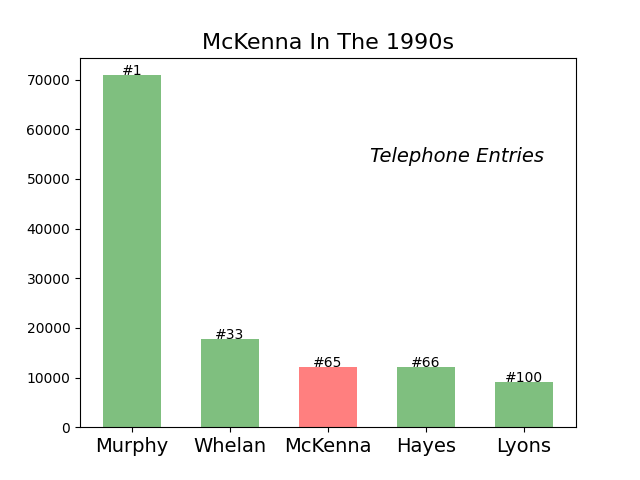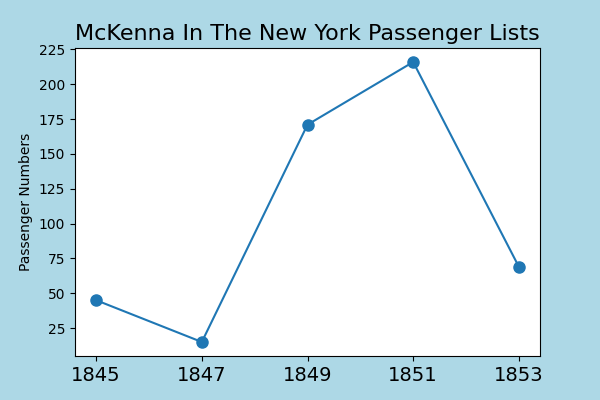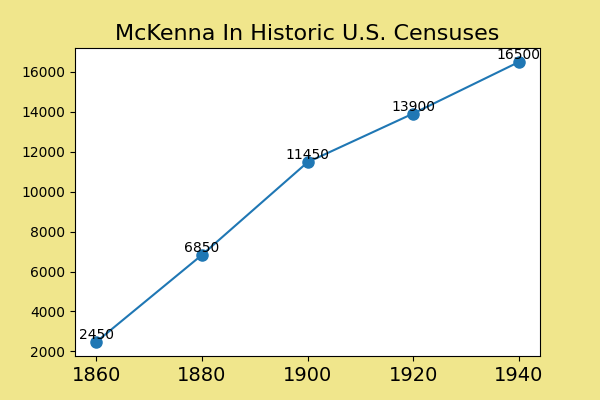This article looks at how common McKenna is as a last name in Ireland and the United States from the 19th century to the present day.
You’ll learn the meaning and origins of the McKenna surname while exploring some notable and famous people that held it.
I use census records, emigration lists, and military archives to uncover fascinating patterns. If you’re studying your genealogy, check out my sources at the end of the post so you can do your own research.
How Common Is McKenna As A Surname In Ireland?
Detailed current statistics about surnames are not publicly released by the Irish government. Instead, they offer the ten most frequently occurring surnames among newborns in the previous year. McKenna
So, I had to look elsewhere for population estimates. Thankfully, an Irish genealogist researched the prevalence of Irish surnames through national phone directories published in the 1990s. Seán Murphy’s estimates aren’t as robust as a census but give a good broad estimate.
McKenna was ranked 65 in the top one hundred names in this decade with a total of 12,100 entries.
This graphic shows how it ranks compared to the 1st, 33rd, 66th, and 100th entries in the survey:

McKenna In The Early 1900s
Only the full censuses from 1911 and 1901 in Ireland are available to the public. Earlier decades were either destroyed by the government (to make room for more storage) or by a huge fire during the Irish Civil War. Later decades are unavailable under privacy laws.
So, let’s concentrate on the early decades of the twentieth century.
I used online archives to calculate the total numbers by surname. I consider these estimates due to some percentage of transcription errors. So, I’ve rounded the numbers to the nearest fifty.
There were 8,500 residents named McKenna on the island in 1911.
Ten years earlier, McKenna had about 8,950 residents in the 1901 census.
Population Estimates In The 1890s
A study of Irish surnames was conducted in 1890 by the head of the Civil Registrations Office. It was published as a “Special Report on Surnames In Ireland.”
The survey estimated that there were about 9,000 people named McKenna in the country.
Emigration To America After The Irish Famine
The Irish have historically emigrated to Britain, the United States, Canada, and Australia. They were motivated by multiple factors, including social unrest, economic desperation, and hunger.
The peak of this migration was driven by what’s known as the Great Irish Famine, a devastating event spanning from 1845 to 1852. Potato blight had a catastrophic effect on Ireland, wiping out the primary food source for a significant portion of the population.
I reviewed the McKenna name in the shipping passenger lists arriving in New York during this period. The departures were from both Ireland and England.
This picture shows how the numbers rose and fell in the years after the famine:

How Common Is McKenna As A Last Name In The U.S.?
Based on the 2010 U.S. census, the name McKenna ranks about 19,075 among Irish names in America with 27,293 bearers.
Although the 2010 census has exact numbers and rankings, the rank I assign here is my estimate. If you’re curious about how I got there, here’s a brief explanation…
Estimating Rank In The United States
Historically, some Irish families with Gaelic surnames took English-sounding names as translations under the influence of colonization.
As these names also have English origins, they will have been brought to the United States by both British and Irish immigrants. Because the census doesn’t ask about specific European origin (e.g. England vs Ireland), it’s impossible to identify the proportion with Irish heritage.
I reviewed the census to identify which names are predominantly Irish in origin. In order to estimate the relative rankings of “Irish” names, I’ve mostly excluded surnames that have varying origins.
McKenna In Historic Times
In a country as young as the United States, tracking the popularity of a surname over time can be fascinating. This reflects other demographic shifts across the country in addition to immigration. Higher child mortality rates and longer life expectancy are just two factors.
The historic census records have been transcribed and digitized. I used online archives to run counts of surname populations.
But the totals can’t be exactly accurate due to transcription errors. So, I’ve rounded the numbers to the nearest 50 in the graph below.
This picture shows the numbers every twenty years from 1860 to 1940:

These are the numbers in the graph:
- 1860: 2,450
- 1880: 6,850
- 1900: 11,450
- 1920: 13,900
- 1940: 16,500
McKenna In World War II
About 8.3 million men and women enlisted in the U.S. Army during the Second World War. Many were of Irish heritage, and some were born in Ireland.
There were registration records for 1,016 soldiers named McKenna who enlisted between 1938 and 1946.
There were 43 who were born in Ireland.
McKenna Surname: Meaning And Origin
McKenna comes from the Gaelic name Mac Cionaoith or Mac Cionaodha. The “Mac” in Irish names literally means “son of”, so the name means “son of Cionaoith”.
The personal name Cionaith derives from two words: “cion” which means respect or affection, and “Aodh”, which means fire. As well as meaning fire, Aodh was the name of a Celtic god of the Underworld. So, the full name is akin to “son of the one who respects Aodh”.
One early McKenna family was a powerful clan in what is now County Monaghan in Ulster. They were chiefs of the barony of Truagh, an area in north Monaghan.
Famous Or Historic People Named McKenna
Here are some notable people with the family name:
- Bernard McKenna (1842 – 1903): his grandfather emigrated from County Tyrone and settled in Pittsburgh. Barney McKenna was elected as mayor of Pittsburgh in 1893.
- Andrew McKenna (1929 – 2023): Chicago-born businessman who was chairman of McDonalds for over ten years and a minority owner of the Chicago Bears.
Sources

External Research
The Ireland 1990s estimates are from Seán J. Murphy’s research paper.
The population estimates of 1890 are based on the “Special Report on Surnames in Ireland“, published in 1909.
The population figures for the 2010 U.S. Census come from a file provided by the U.S. Census Bureau.
Internal Research
Some of the population numbers are based on my own research and calculations using online archives. I’ve rounded those numbers to the nearest 50 to account for transcription errors and other technical issues with online databases of this type.
The Irish census estimates for 1901 and 1911 are my calculations based on the Irish National Archives
I plotted the emigration figures from 1845 to 1854 based on calculations from the archives of the New York Passenger Lists (1820-1957).